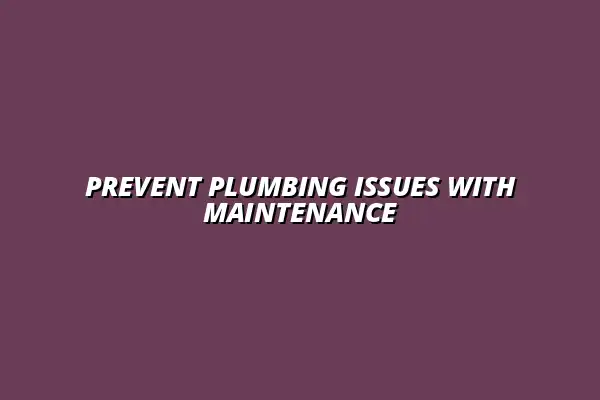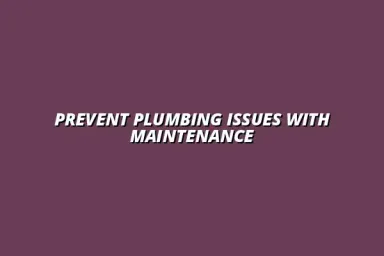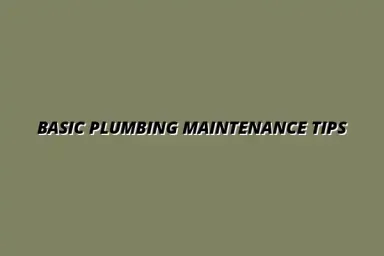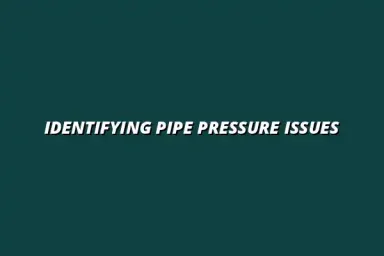Understanding the Importance of Regular Plumbing Inspections
Regular plumbing inspections are crucial for maintaining the health of your home’s plumbing system. They help identify potential issues before they escalate into costly repairs. By being proactive and scheduling these inspections, homeowners can ensure their plumbing functions smoothly, which can lead to a more comfortable and trouble-free living environment.
During a plumbing inspection, a professional assesses various components of your plumbing system. This includes checking pipes, fixtures, and appliances. The goal is to catch any problems early, preventing emergencies and extending the lifespan of your plumbing system. Regular maintenance, as described in this helpful guide on preventative plumbing maintenance, is key.
Defining Plumbing Inspections and Their Purpose
Plumbing inspections are comprehensive evaluations of your plumbing system, typically conducted by a licensed plumber. They aim to assess the condition of your pipes, look for leaks, and check for signs of wear and tear. The purpose of these inspections is not just to identify existing issues but also to provide peace of mind for homeowners.
By having a clear understanding of your plumbing's condition, you can make informed decisions about maintenance and repairs. This proactive approach can save you from unexpected breakdowns and emergencies that could disrupt your daily life. For example, regular water heater inspections can prevent costly repairs.
- Check for leaks in pipes and fixtures.
- Assess the condition of water heaters and appliances.
- Inspect drainage systems to prevent blockages.
- Review pipe insulation to prevent freezing.
The Role of Maintenance in Preventing Plumbing Problems
Regular maintenance plays a significant role in preventing plumbing problems. By keeping up with routine checks and repairs, you can avoid more serious issues that may arise from neglect. It’s similar to regular health check-ups — addressing minor concerns promptly keeps larger issues at bay.
Maintenance tasks can include clearing drains, monitoring water pressure, and checking for signs of rust or corrosion. This consistent care is essential for ensuring the longevity of your plumbing system, which can save you from major headaches down the line. Remember to schedule annual drain inspections and cleaning to prevent clogs.
- Regularly clean out drains to prevent clogs.
- Inspect and replace worn seals and washers.
- Monitor water pressure to avoid stress on pipes.
- Flush water heaters annually to maintain efficiency.
Common Plumbing Issues That Can Be Prevented
Understanding common plumbing issues that can be prevented is key to maintaining a healthy home. Many homeowners face problems that arise from neglect or lack of awareness. With a little foresight, you can tackle these issues before they disrupt your life. For instance, preventative measures can significantly reduce the likelihood of plumbing leaks in your kitchen.
Some of the most frequently encountered plumbing problems include leaks, clogs, and water pressure issues. Recognizing the signs early on can help you act swiftly and avoid more significant damage or costly repairs later.
Identifying Leaks Before They Become Major Problems
Leaks can start small but can quickly lead to significant water damage if not addressed. Regular inspections allow you to catch leaks early, saving you money on water bills and repairs. Some signs of leaks include water stains, damp spots on walls or ceilings, and mold growth.
It's important to take action if you notice any of these signs. Even minor leaks can lead to structural issues over time. If you're unsure, calling a professional can provide you with the reassurance and support you need to handle the situation effectively. Learning how to prevent pipe leaks with regular maintenance is crucial.
- Check under sinks for water pooling.
- Inspect walls for unusual dampness or stains.
- Monitor your water bill for unexpected increases.
- Listen for dripping sounds that may indicate a leak.
Understanding the Impact of Clogged Drains and How to Avoid Them
Clogged drains are another common plumbing issue that can be easily avoided with proper care. They can lead to slow drainage and, in some cases, backflow, which can cause significant damage. Regular cleaning and maintenance can help keep your drains clear and functional.
There are several ways to prevent clogs. Avoiding putting grease, hair, and food waste down the drain can go a long way in maintaining clear pipes. Additionally, using strainers in sinks and showers can catch debris before it causes problems. A plumber in your area, such as a plumber in Billesley, Birmingham, can offer professional advice.
- Use strainers in sinks and showers.
- Avoid pouring grease down the drain.
- Flush drains with hot water regularly.
- Schedule professional drain cleaning as needed.
Professional Plumbing Services: When to Call an Expert
Sometimes, despite our best efforts, plumbing issues can arise that require an expert's touch. When you encounter a problem that seems outside your skill set, it's best to call a licensed plumber. These professionals have extensive training and experience, making them invaluable when tackling complex plumbing challenges.
Hiring a licensed plumber not only ensures the job is done right but also provides peace of mind. You can trust that they will follow local codes and regulations, preventing future headaches. So, when should you reach for the phone and call a professional? Regular bathroom plumbing inspections can help prevent many issues.
Understanding the Benefits of Hiring a Licensed Plumber
There are several reasons why hiring a licensed plumber is a smart choice. First and foremost, they possess the skills needed to address a variety of plumbing issues effectively. This includes not just fixing leaks or clogs but also installing new fixtures or systems.
- Expertise: Licensed plumbers have undergone rigorous training to diagnose and fix plumbing problems.
- Safety: They ensure that all work complies with local safety codes, reducing risks in your home.
- Long-term Solutions: Professionals can recommend solutions that prevent future issues, saving you money in the long run.
Additionally, licensed plumbers often provide warranties on their work, offering you extra reassurance. This means if something goes wrong after the job is complete, you're covered!
What to Expect During a Professional Plumbing Inspection
During a professional plumbing inspection, you can expect a thorough examination of your plumbing system. The plumber will check for signs of leaks, corrosion, and other potential problems. They will also assess the condition of your pipes and fixtures to ensure everything is functioning properly.
Typically, a plumbing inspection involves the following steps:
- Checking water pressure and flow throughout the home.
- Inspecting visible pipes for leaks or damage.
- Examining fixtures like sinks, toilets, and showers for functionality.
- Assessing water heaters and sump pumps for efficiency.
This professional touch can catch minor issues before they escalate into costly repairs. Regular inspections are key to maintaining your plumbing system and can help avoid unexpected emergencies!
Addressing Common Questions About Plumbing Maintenance
As we dive deeper into plumbing maintenance, some common questions arise. Many homeowners wonder how often they should schedule inspections or what to look for during their inspections. Addressing these questions can help you take better control of your plumbing system.
Understanding the answers to these questions can guide you in maintaining a healthy plumbing system and catching issues early.
How Can Regular Inspections Save You Money?
Regular plumbing inspections can be a game changer when it comes to saving money. By identifying small problems before they develop into major issues, homeowners can avoid expensive repairs down the line. This proactive approach keeps your plumbing system running smoothly and efficiently!
- Early Detection: Catching leaks or clogs early can prevent costly damage to your home.
- Reduced Water Bills: Fixing hidden leaks can lead to significant savings on your water bill.
- Prolonging Lifespan: Regular maintenance extends the life of your plumbing system, delaying the need for replacements.
In short, investing in regular inspections is a wise financial decision. It not only protects your home but also your wallet!
What Should You Look for During a DIY Inspection?
If you're taking a hands-on approach to your plumbing maintenance, knowing what to look for during a DIY inspection is crucial. Here are some key areas to focus on:
- Visible Pipes: Check for any damp spots, rust, or corrosion.
- Fixtures: Ensure that sinks, toilets, and showers are draining properly and not leaking.
- Water Heater: Look for any signs of rust or leaks around the base.
- Drains: Watch for slow drainage, which could indicate a clog forming.
Being proactive and addressing these issues early can save you time and stress later on. Plus, it gives you a sense of accomplishment knowing you're taking care of your home!
Recap of Essential Steps to Prevent Plumbing Issues
As we wrap things up, it's essential to recap the important steps we've discussed to keep your plumbing system in good shape. Regular inspections and maintenance can prevent a host of issues, and knowing when to call a professional is crucial for homeowners.
Let's summarize the key practices we've covered!
Summarizing Key Maintenance Practices
- Schedule regular plumbing inspections with a licensed professional.
- Perform DIY inspections to catch small issues early.
- Keep a maintenance checklist to stay organized.
- Address problems promptly to avoid costly repairs.
These practices not only protect your plumbing system but also enhance your home's overall efficiency!
Encouraging Long-Term Engagement With Plumbing Care
Finally, I encourage you to make plumbing maintenance a part of your regular home care routine. Staying engaged with your plumbing system will ensure it remains in great condition for years to come. It’s all about creating good habits!
Remember, whether you're tackling small fixes yourself or calling in the pros, taking care of your plumbing is an investment in your home. Stay proactive and enjoy a stress-free plumbing experience!

 Kiran Almasi
Kiran Almasi

